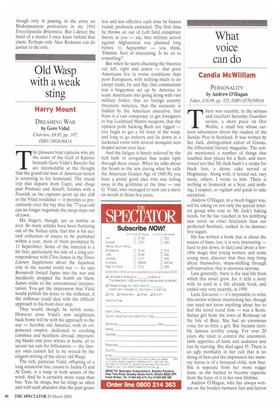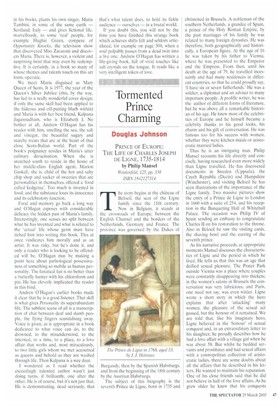What voice can do
Candia McWilliam
PERSONALITY by Andrew O'Hagan Faber, fl 6.99, pp. 325, ISBN 05 76195016 There was recently, in the serious and excellent Saturday Guardian review, a short piece on Oor Wullie, a small boy whose cartoon adventures divert the readers of the Sunday Post in Scotland. It was written by Ian Jack, distinguished editor of Granta, the influential literary magazine. The article mentioned a number of things that touched dear places for a Scot, and mentioned too that Mr Jack hadn't a recipe for black bun, a dense cake served at Hogmanay. Along with, it turned out, very many, others, I wrote to him. There is nothing so homesick as a Scot, and nothing, I suspect, as vigilant and quick to take exception.
Andrew O'Hagan, in a much bigger way, will be taking on not only the special interest group who rose to Mr Jack's baking needs, for he has touched in his terrifying new novel on other fairylands than our perfected Scotland, soaked in its destructive sugars.
He has written a book that is about the nature of fame (no; it is very interesting — hard to put down, in fact) and about a horrible magic that young women, and some young men, discover that they may bring about themselves, shape-shifting through self-starvation, that is anorexia nervosa.
Less generally, there is the real life from which this novel grew, for it tells a story with its seed in a life already lived, and ended only very recently, in 1999.
Lena Zavaroni — it's impossible to write this review without mentioning her, though one need not know anything about her to feel the novel stand firm — was a ScotsItalian girl from the town of Rothesay on the Isle of Bute. She had an enormous voice for so little a girl. She became terribly famous terribly young. For over 20 years she tried to control the uncontrollable appetites of fame and audience and loss by starving. She died aged 35. There is an ugly morbidity in her cult that is no doing of hers and the impression her memory leaves is of a betrayed child, now free. She is separate from her more vulgar fame, as she battled to become separate from the force of it in her own lifetime.
Andrew O'Hagan, who has always written on the borders between fact and fiction in his books, plants his own singer, Maria Tambini, in some of the same earth — Scotland, Italy — and gives fictional life, marvellously, to some 'real' people, for example Hughie Green, compere of Opportunity Knocks, the television show that discovered Miss Zavaroni and discovers Maria. There is, however, a violent and surprising twist that may even be redemptive. It is certainly, in a book so many of whose themes and talents touch on this art form, operatic.
We meet Maria disguised as Mary Queen of Scots. It is 1977, the year of the Queen's Silver Jubilee (this, by the way, has led to a really wonderful cover design; if only the same skill had been applied to the hideous and off-putting blurb within) and Maria is with her best friend, Kalpana Jagannadham, who is Elizabeth I. No bother at all, Andrew O'Hagan has his reader with him, smelling the sea, the salt and vinegar, the beautiful sugary and starchy treats that are at the heart of that close Scots-Italian world. Part of the book's poignancy resides in Maria's utter culinary deracination. When she is snatched south to reside in the home of her middle-class English agent, Marion Gaskell, she is, child of the hot and salty chip shop and sucker of sweeties that are personalities in themselves, offered a 'food called kedgeree'. Too much is invested in food, and the substance loses its innocence and its celebratory function.
Food and memory go back a long way and O'Hagan exposes with considerable delicacy the hidden past of Maria's family. Interestingly, one senses no split between what he has invented and what is related to the 'actual' life whose germ must have itched him into writing this book. This at once vindicates him morally and as an artist. It was risky, but he's done it. and only a reader who is looking to be offended will be. O'Hagan may be making a point here about pathological possessiveness of something so mobile as human personality. The fanatical fan is no better than a butterfly hunter with his chloroform and pin. He has cleverly implicated the reader in this bind.
Andrew O'Hagan's earlier books made it clear that he is a good listener. That skill is what gives Personality its superabundant life. The subtlest scene of all is a transcription of chat between deaf and dumb people, the flying fingers scandalising away. Voice is given, as is appropriate in a book dedicated to what voice can do, to the drowned, to the misunderstood, to the interned, to a time, to a place, to a love affair that works and, most miraculously, to two little girls whom we met accoutred as queens and behold as they are washed through life. Thon Kalpana is a wee doat.
I wondered as I read whether the exceedingly talented author wasn't just doing turns, if brilliantly, one after the other. He is of course, but it's not just that. He is demonstrating, dead seriously, that that's what talent does, to hold its fickle audience — ourselves — in a brutal world.
If you doubt this, you will not by the time you have finished this strange book which achieves shifts felt and seldom articulated, for example on page 304, when a soul palpably passes from a dead twin into a live one. Andrew O'Hagan has written a life-giving book, full of vivid touches like salt crystals on the tongue. It reads like a very intelligent token of love.









































































 Previous page
Previous page